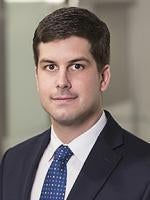As the COVID-19 pandemic continues, businesses and governments are acting to flatten the curve. Recently, California, the largest state by population, implemented an extensive quarantine statewide, affecting over 40 million people. New York and other states and municipalities also have issued similar closure orders. In this blog post, we continue to examine the issues surrounding civil authority orders in the context of potential insurance coverage for COVID-19, this time focusing on a “waiting period” prior to coverage.
As discussed in our prior blog, many insurance policies offer business income and extra expense coverage (business interruption) pursuant to “civil authority” provisions. This coverage applies when a civil authority, such as a state, local, or federal government, prohibits access to an insured’s premises due to direct physical loss of or damage to property other than at the insured’s premises from a covered cause of loss. Most policies do not begin covering a loss caused by a civil authority order until a certain period of time, the “waiting period,” has concluded. This amount of time is usually a period of days. For example, the ISO CP00300402 form states:
The coverage for Business Income will begin 72 hours after the time of that action and will apply for a period of up to three consecutive weeks after coverage begins.
Because a waiting period is a condition to coverage, some insureds have argued that a waiting period is a deductible. In BY Development, Inc. v. United Fire & Casualty Co., No. 04-5116, 2006 U.S. Dist. LEXIS 14703, at **9-10 (D.S.D. Mar. 14, 2006), evacuation orders were issued for several towns because of wildfires. The policyholder evacuated and closed its business and it claimed that it lost business income during and after the evacuation period. The policy had the same waiting period quoted above. The insurer denied the policyholder’s claim because the business was not closed for more than 72 hours.
The policyholder argued that the policy language stating that there was no deductible nullified the 72 hour waiting period language in the policy. The court found the waiting period was not a deductible and compared it to a self-insured retention, stating:
The Policy in the instant case had no deductible, but defined the time coverage began as seventy-two hours after the action of civil authority that prohibits access to the insured premises. Under the terms of the Policy, no amount was deducted from the Business Income or Extra Expense coverage during the period of time the Defendant agreed to provide coverage. Like a self-insured retention [], this seventy-two hour period differs from a deductible . . . [t]he waiting period is conceptually distinct from a deductible and, as such, does not create an ambiguity when read in conjunction with the “No Ded.” language on the declarations page. No deductible applies under the terms of the Policy; thus, once coverage begins under the Policy (seventy-two hours after an action of civil authority that prohibits access to the covered premises), the Defendant would have been liable to cover the losses fully, without a deductible amount withheld from the insured coverage.
The court eventually found there was no coverage because a civil authority did not restrict access for the 72 hour waiting period.
When a waiting period begins is another question. In Jones, Walker, Waechter, Poitevent, Carrere & Denegre, LLP v. Chubb Corp., No. 09-6057, 2010 U.S. Dist. LEXIS 109055, at **11-14 (E.D. La. Oct. 12, 2010), civil authorities issued two orders in response to Hurricane Gustav. On August 30, the mayor of New Orleans issued the first order, a mandatory evacuation order, to become effective on August 31 at 12:00 pm. This order issued before the hurricane arrived and before there was any physical damage to trigger coverage. On September 2 at 8:42 pm, the mayor issued the second order, a voluntary evacuation order that rescinded the first order as of September 4 at 12:01 am.
The insured’s policy included a 96 hour waiting period. The policy stated, “[t]he Waiting Period . . . will begin immediately following the time the civil authority prohibits access” as a “direct result of direct physical loss or damage to property.” The insured argued the waiting period began on August 31 at 12:00 pm, when the first order became effective, and concluded on September 4 at 12:00 pm. The court disagreed, finding that the waiting period began on September 2 at 8:42 pm, when the second order was issued, which was after the necessary condition of physical damage had occurred. The court stated:
The only reasonable interpretation of the “will begin immediately following the time the civil authority prohibits access” language is . . . unlike other business income coverages that trigger with property damage, Civil Authority coverage requires property damage and a civil authority order . . . [t]he waiting period “will begin immediately following the time the civil authority prohibits access” clearly means that coverage begins, not when the property damage is sustained that might in fact prohibit access, but only when the civil authority prohibits access, again based on the normal sequence of events. It would have certainly been clearer if the statement read “will begin immediately following the time the civil authority prohibits access following the direct physical loss” but this additional caveat is implicit in light of the coverage requirements.
Although the court ultimately found there was no coverage, it assumed for purposes of the motions that the requirements necessary for the civil authority coverage were in place as of the September 2 order. The court then held that the 96 hour waiting period would have concluded on September 6 at 8:42 pm, which was after the prohibition was rescinded.
As civil authorities issue subsequent orders in the face of COVID-19, insurers and policyholders need to consider the implication of Jones.
Co-Authored by Ellen Farrell





 />i
/>i

